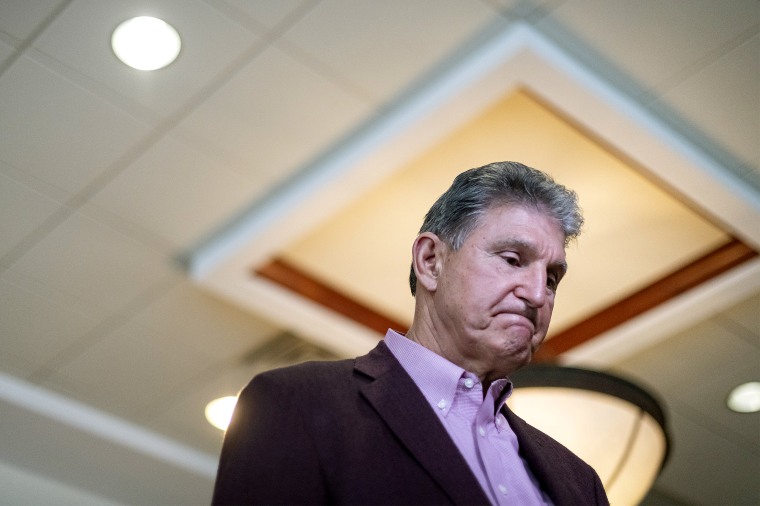WASHINGTON — Congress returns from recess this week to a lengthy to-do list that includes infrastructure, judicial nominations and investigating the Jan. 6 attack on the Capitol.
The biggest agenda item on Capitol Hill is to try to strike a bipartisan deal — or give up on talks — for a sweeping infrastructure bill, President Joe Biden's top priority.
Democrats face a dilemma about how long to negotiate with Republicans before they pull the plug. Any deal would have to be far smaller than Biden's initial $1.7 trillion request. But it's unclear that they can reach even a modest deal. It's also unclear whether Democrats have the votes to pass something along partisan lines.
"Right now, basically we need to be bipartisan," Sen. Joe Manchin, D-W.Va., said Thursday in West Virginia.
Manchin is a complicating factor for Democrats, because his vote is needed to evade a Senate filibuster. And he isn't making it easy for party leaders to gauge when — or whether — he'll be ready.
If history is any indication, Manchin may never explicitly call for pulling the plug on talks with Republicans. But that doesn't necessarily mean he'll vote to stop his party from moving forward.
Manchin was similarly elusive about the process surrounding the $1.9 trillion Covid-19 relief bill, but he didn't stop Biden when the decision was made to abandon bipartisan talks. Manchin continued to call for bipartisanship until the very end.
Manchin's political calculus is trickier this time, because the lead Republican negotiator, Sen. Shelley Moore Capito, also represents West Virginia, a deeply red state.
But sources familiar with Manchin's thinking say he is determined to pass a bill. He has expressed support for an "enormous" infrastructure package paid for with new taxes, aligning him more closely with Biden than with the GOP.
"We need a bipartisan infrastructure bill," Manchin said on "Fox News Sunday." "We most definitely need that. And infrastructure's something that's been delayed for far too long by past administrations. So it's time for us to move forward."
He added that he is "very confident" that a compromise can be reached, pointing to the concessions that have already been made.
"We think we can find a pathway forward," he said. "We're not that far apart."
In an interview Sunday on CNN's "State of the Union," Energy Secretary Jennifer Granholm said she is confident that "if there's a bipartisan vote," Manchin "will definitely be there."
"And he's working to help shape it," she said. "Ultimately, what's good for West Virginians, they need these investments. They built energy 1.0. They got us to where we are as a nation. Joe Biden wants to have them see their future in energy 2.0. So does Joe Manchin.
"And the investments in the American Jobs Plan have got to reflect that," she added.
Jan. 6 inquiry, new judges and filibuster wars
When the House returns, Speaker Nancy Pelosi, D-Calif., will have to decide how to investigate the Jan. 6 attack on the Capitol after Senate Republicans filibustered a bipartisan commission.
Pelosi laid out four options on a conference call with Democrats last week, two sources said: Give the Senate another chance to pass the bill, form a select committee in the House, allow the current committees to investigate or empower one standing committee, such as the House Homeland Security Committee, to take charge.
Across the Capitol, Senate Majority Leader Chuck Schumer, D-N.Y., said the Senate will begin confirming Biden's judicial nominees, including U.S. District Judge Ketanji Brown Jackson for the influential D.C. Circuit Court of Appeals. She is widely seen as a short-lister for the Supreme Court if a seat were to open up.
Schumer hopes to pass a bill to enhance U.S. competitiveness with China, which he wrote with Republican Sen. Todd Young of Indiana.

He has also said he plans to bring up a series of bills this month to advance equal pay for women, bolster LGBTQ rights and toughen gun laws. All have viable paths to majorities, but they are likely to be filibustered, which would force Democrats to decide whether to keep or weaken the 60-vote threshold.
And Schumer has promised a vote on the For the People Act, a sweeping bill passed by the House to expand access to the ballot box and overhaul how elections are conducted. The measure has 49 of 50 Democratic-voting members signed on as co-sponsors; Manchin is the exception.
Manchin announced Sunday that he won't vote in favor of the legislation, imperiling its chances to pass. And he said he's not prepared to vote to eliminate the filibuster, which some Democrats have argued should happen to advance voting legislation.
"It's the wrong piece of legislation to bring our country together and unite our country, and I'm not supporting that because I think it would divide us more," Manchin said on "Fox News Sunday." "I don't want to be in a country that's divided any further."
Schumer is bracing Democrats for a tough few weeks.
"Looking ahead, the June work period will be extremely challenging," Schumer wrote in a letter to colleagues May 28. "I want to be clear that the next few weeks will be hard and will test our resolve as a Congress and a conference."

